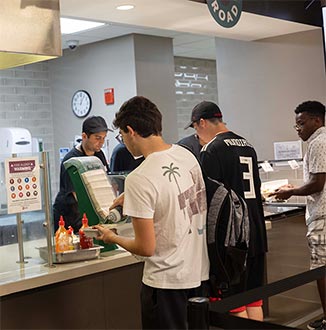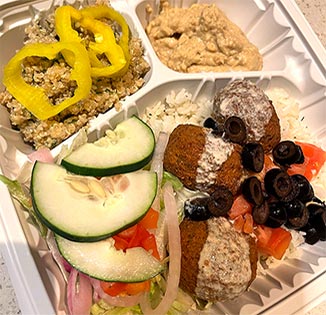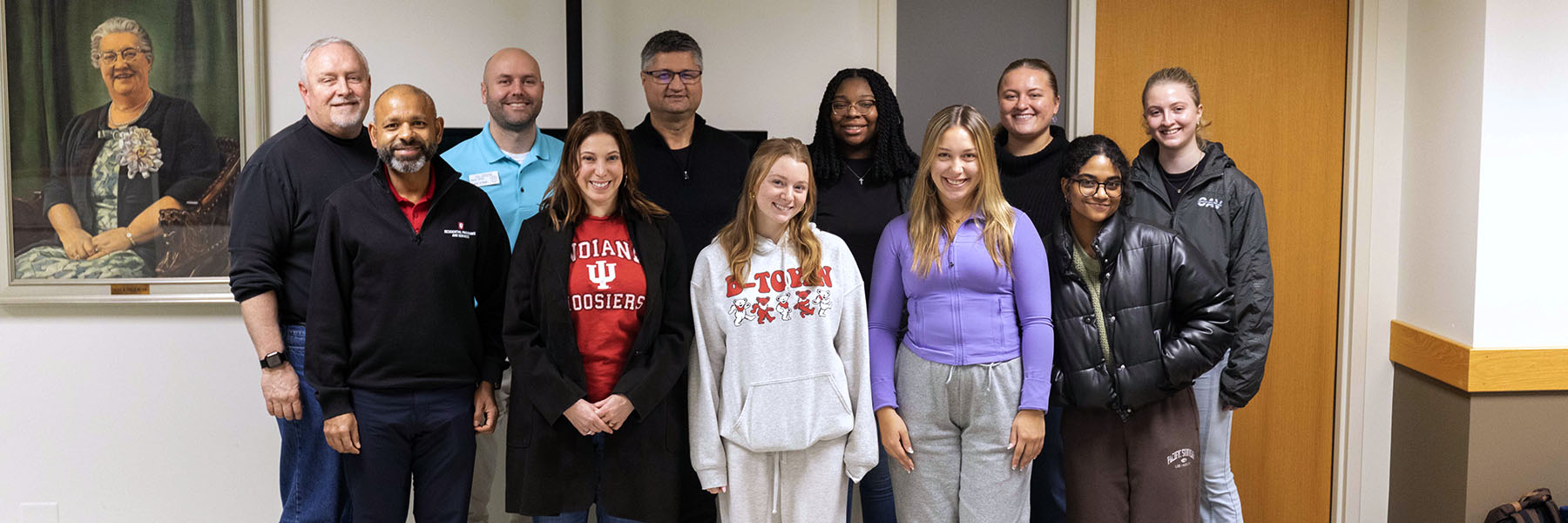On a recent Friday afternoon in late January, members of IU's Student Meal Plan Committee filed in to the 801 N. Eagleson building to meet with campus dining leadership and share their recent observations about food on campus—the good, the bad, and the potential.
 The student-led group is currently chaired by the Vice President of Public Relations and Marketing for the Residence Hall Association, Rachel Abioye, a first-year nursing student. Rachel convenes bi-weekly meetings that foster conversation between the 29 appointed students, plus reps from Union Board and IU Student Government, with registered dietitians, chefs, heads of residential and retail dining, and other campus decision-makers.
The student-led group is currently chaired by the Vice President of Public Relations and Marketing for the Residence Hall Association, Rachel Abioye, a first-year nursing student. Rachel convenes bi-weekly meetings that foster conversation between the 29 appointed students, plus reps from Union Board and IU Student Government, with registered dietitians, chefs, heads of residential and retail dining, and other campus decision-makers.
Rachel said chairing the committee—which is included in her responsibilities as VP of PR and marketing—gives her a voice in on-campus dining decisions. "It has also granted me the ability to provide students in residence halls with the same opportunity," she added. "I enjoy interacting with other students and dining administration to discuss ways to improve the dining experience for students."
'For the betterment of the students'
Rachel opened the meeting with roll call, followed by an invitation for students to openly share their ideas and experiences with the people on campus who can enact the changes.
 Among the topics: praise for the poke bowls at Hodge from a pescetarian (along with a question about the $15 price point for non-meal plan holders), a question about the NetNutrition portion size calculator, kudos for increased vegetarian options and baked potato bar, a report of some dry beef tips, and a request for cinnamon rolls as a breakfast option (turns out they're available at Union Street and Sugar & Spice in the IMU).
Among the topics: praise for the poke bowls at Hodge from a pescetarian (along with a question about the $15 price point for non-meal plan holders), a question about the NetNutrition portion size calculator, kudos for increased vegetarian options and baked potato bar, a report of some dry beef tips, and a request for cinnamon rolls as a breakfast option (turns out they're available at Union Street and Sugar & Spice in the IMU).
Vice President of Marketing & Outreach for Union Street Center Student Government Maddi Sponsel, a marketing major from Greenwood, said providing feedback can be intimidating, but that it is well-received. "I felt a little nervous coming in, but I just know my voice is for the betterment of students."
From idea to actuality
Since 1998, IU Bloomington has sought student input on campus dining options. More than 26 years later, the collaboration continues through the Student Meal Plan Committee.
The now-retired former IU Dining director Sandra Fowler said that before 1995, IU's meal plan was mandatory; all students paid the same price for 20 meals per week in an all-you-care-to-eat format. Each residence center served the same or similar food for breakfast, lunch, and dinner, with two or three hours allotted for each, and lengthy waiting times the first hour.
While the dining scene of 2024 looks quite different, with an increasing focus on local and sustainable sourcing, innovative concepts and global cuisines, and food from favorite local restaurants offered on campus, the importance of student input remains a priority.
Sophomore Nadia Cain, who is studying environmental management and astrophysics, said she enjoys working with professionals and appreciates the committee's creativity in problem-solving. "Last year, one of my friends proposed we put wet wipes in dining halls so people could clean their tables. Now, in most locations, there are wet wipe stands. It's one of my favorite things to see an idea go from that room to actuality."
Other ideas sparked by student feedback include new plant milk stations, the poke concept at Hodge, the addition of quinoa to salad bars, and The Globe, which brings favorite local restaurant food to campus as part of the dining plan to support the community while offering more options.
Meal Plan Committee participants eat in the dining halls like any other students, but with heightened attention so they can gather useful feedback to share with the group.
In addition to observing, listening, and eating on campus, Nadia tries to dedicate up to an hour for research each week—for example, looking into sustainable utensils that would be economically friendly for IU and useful for students.
Committee participants are the first to hear about new dining concepts or events, and each member receives unlimited meal swipes at AYCTE (all-you-care-to-eat) campus locations, one of IU's efforts to combat food insecurity. Students interested in participating should contact Rachel Abioye at rha@indiana.edu. Chairing the committee is a one-year commitment included in the duties of the RHA's vice president for PR and marketing.
While the committee contributes key insights to IU Dining, individual experiences vary, and all student feedback holds value.
"Remember at the end of day, you are paying for this," Maddi said. "You have a voice, and you can use it. You're a stakeholder, too."


